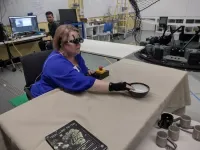(Press-News.org) After surveying the views expressed by 41 advocacy, medical, and transplant-focused organizations on the Uniform Determination of Death Act, a brain injury expert is calling for much-needed reforms to the legal definition of death in the United States. The recently announced pause by the Uniform Law Commission, which is spearheading revisions, is disappointing, the expert notes, but should not permanently stall practical fixes to longstanding problems with the Death Act.
“This study shows that most medical organizations support revisions of the Uniform Determination of Death Act to align the legal description of the neurological criteria for death with medical standards,” said Ariane Lewis, MD, a neurocritical care specialist and professor in the Departments of Neurology and Neurosurgery at NYU Grossman School of Medicine.
Specifically, Lewis argues, the legal description for death needs to reflect medical guidelines, which do not require that loss of hormone function be considered when declaring someone brain dead. Moreover, Lewis says, the Death Act needs to be revised to include legal guidance for health care providers about what to do when a family objects to stopping mechanically assisted breathing for a relative who is already brain dead. The act, for example, needs to clarify when and for how long, if not indefinitely, a person can be kept on a ventilator after brain death if a family objects to it being removed.
Lewis says her survey results showed that 34 organizations (83%) favored revisions to the Death Act. However, she acknowledges that views about how to revise it varied. Some religious organizations and patient advocacy groups were opposed to using loss of brain function as a criteria for declaring death, favoring instead the traditional definition of death as having occurred after the heart stops beating.
Lewis, who also serves as director of neurocritical care at NYU Langone Health, has already shared her survey results and perspective with the commission, whose work to amend the Death Act was suspended in late September. Lewis has been one of 100 observers working with the commission for the past three years on revisions to the statute.
Publishing in the journal Neurocritical Care online Oct. 25, the study involved a detailed review of the comments and viewpoints submitted to the commission between January and July 2023 by 41 organizations impacted by the Death Act.
Historically, a person was considered dead when their heart stopped beating and they could no longer breathe on their own. Technological advances in mechanical ventilation changed that, allowing people, in some cases, to keep breathing after they had suffered catastrophic brain injuries leading to coma, and had lost the nerve function needed for them to breathe on their own. Such cases led in 1981 to the U.S. Uniform Determination of Death Act, which defined death as either the irreversible cessation of all brain or cardiopulmonary functions. This definition was adopted by all American states as the legal basis for declaring a person dead.
The act, however, failed to specify the medical tests needed to determine if someone was dead. Furthermore, a small number of states allow families to voice objections on religious grounds. This includes some Orthodox Jews, Muslims, and Catholics who equate withdrawal of mechanical ventilation to euthanasia, even after a person has been declared brain dead. Dozens of lawsuits have been filed against healthcare facilities by families wishing to keep a relative, who has already been declared brain dead, on mechanical ventilation indefinitely.
Citing the need for more legal guidance for physicians, Lewis is calling on the commission to accept international and national medical standards for death by neurological criteria. Among these are guidelines published by the American Academy of Neurology, Society of Critical Care Medicine, American Academy of Pediatrics, and Child Neurology Society, none of which require the loss of hormone function when declaring someone brain dead.
Lewis points out the loss of “all functions of the entire brain,” which could also cover cessation of hormone secretion, is included in the act’s definition of death. However, such loss of hormone function is not needed to be declared dead by brain criteria using current medical standards.
The Death Act’s definition, Lewis argues, is not only too broad, but it is also impractical because there is currently no medically established standard for measuring whether and when hormone secretion from the brain has stopped. Thus, she says, the act should be clarified to specify what brain functions must be lost in order to declare someone legally dead, recognizing that loss of hormone secretion should not be among the criteria.
Another study finding was that patient advocacy groups favored revisions to the act that require family consent before discontinuing mechanical ventilation after a person is declared dead. Medical organizations, Lewis says, are opposed to this position.
“The results of this survey show that while stakeholders support revisions to the Death Act, medical organizations and patient advocacy groups are deeply divided on the approach to do this,” said Lewis. With prospects for consensus slim and the commission’s efforts paused as a result, Lewis concludes that “without revisions to the law, it remains unclear what tests are required for declaring someone brain dead, and physicians and the public do not have legal guidance about how to resolve conflicts when families object to death by brain criteria.”
Media Inquiries:
David March
212-404-3528
david.march@nyulangone.org
END
Brain injury expert says important changes still needed to law defining death despite reform pause
2023-10-26
ELSE PRESS RELEASES FROM THIS DATE:
Study examines racial differences in care among older Americans
2023-10-26
Older Black Americans are more likely to receive low value acute diagnostic tests than older White Americans, while older White Americans were more likely to receive low value screening tests and treatments, finds a study published by The BMJ today.
Low value care refers to services that provide little to no benefit yet have potential for harm, which can include laboratory tests, scans, and medication.
These differences were generally modest and were largely driven by differential treatment within health systems. But the researchers say the results “highlight ...
Industry payments to physicians linked to use of some non-recommended and low value drugs among cancer patients
2023-10-26
Patients with cancer whose oncologist receives payments from industry appear more likely to receive some non-recommended and low value treatments, finds a US study published by The BMJ today.
This finding raises potential concerns about quality of care, and the researchers say it may be appropriate to re-examine the current status of personal payments from the drug industry to physicians.
Research shows a consistent link between industry payments and prescribing behaviour, but whether payments to physicians have positive or negative consequences for patient care has not been evaluated empirically, say the ...
Hospitals accused of using foreign doctors as “cheap labour” in fellowship schemes
2023-10-26
English hospital trusts have been accused of using foreign doctors as “cheap labour” as part of fellowship schemes in which they can be paid less than trust-employed doctors and sent home if they become pregnant, an investigation by The BMJ has found.
Foreign doctors come to English hospital trusts as “fellows” as part of the Academy of Medical Royal Colleges’ Medical Training Initiative (MTI) scheme, explains investigations editor, Madlen Davies.
They work for two years in the NHS to gain experience that they will take back to their home countries afterwards. A proportion of fellows are sponsored, for example by their ...
Time to treat the climate and nature crisis as one indivisible global health emergency
2023-10-26
Over 200 health journals across the world have come together to simultaneously publish an editorial calling on world leaders and health professionals to recognise that climate change and biodiversity loss are one indivisible crisis and must be tackled together to preserve health and avoid catastrophe.
The authors say it’s a “dangerous mistake” to respond to the climate crisis and the nature crisis as if they were separate challenges, and urge the World Health Organization to declare this indivisible crisis as a global health emergency.
The editorial is published in leading titles from around ...
Vision via sound for the blind
2023-10-26
ustralian researchers have developed cutting-edge technology known as “acoustic touch” that helps people ‘see’ using sound. The technology has the potential to transform the lives of those who are blind or have low vision.
Around 39 million people worldwide are blind, according to the World Health Organisation, and an additional 246 million people live with low vision, impacting their ability to participate in everyday life activities.
The next generation smart glasses, which translate visual information into distinct sound icons, were developed by researchers from the University of Technology Sydney and the University of Sydney, ...
New study reveals inequities in access to mechanical circulatory support in US patients with cardiogenic shock
2023-10-26
SAN FRANCISCO – A new study presented today at TCT 2023 sought to evaluate the presence of racial, ethnic, and socioeconomic inequities in access to mechanical circulatory support in the United States among patients with cardiogenic shock (CS). The findings, published in the Journal of the Society for Cardiovascular Angiography & Interventions (JSCAI), revealed stark disparities, particularly among Black patients, that further highlight systemic inequities in access to lifesaving therapies.
CS is a life-threatening condition in which your heart suddenly cannot pump enough blood to meet the body’s needs. As a result, your ...
Breast cancer survivors: New training to treat 'chemo-brain'
2023-10-26
A form of computerised attention and memory training can improve impaired attention and memory issues in women treated for breast cancer, University of Reading researchers have found.
‘Chemo-brain’ refers to cognitive problems like forgetfulness, difficulty concentrating, and lapses in everyday attention, which are common side effects of breast cancer treatments including chemotherapy.
The findings, published in the journal Psycho-Oncology, suggest that an adaptive “dual memory tracking” training program may help breast cancer survivors cope ...
Pottery becomes water treatment device for Navajo Nation
2023-10-26
Large chunks of the Navajo Nation in the Southwest lack access to clean drinkable water, a trend that has been rising in many parts of the U.S. in recent years. A research team led by engineers with The University of Texas at Austin aims to change that.
The team has developed a new water filtration solution for members of the Navajo Nation, lining clay pots with pine tree resin collected from the Navajo Nation and incorporating tiny, silver-based particles that can be used to purify water to make it drinkable.
“Making water filtration technology cheap doesn’t solve ...
AWE launching to space station to study atmospheric waves via airglow
2023-10-26
NASA’s Atmospheric Waves Experiment, or AWE, mission is scheduled to launch to the International Space Station in November 2023, where it will make use of a natural, ethereal glow in Earth's sky to study waves in our planet's atmosphere.
Built by Utah State University’s Space Dynamics Laboratory in North Logan, Utah, AWE will be mounted on the exterior of the space station. From this perch, AWE will stare down toward Earth, tracking undulations in the air known as atmospheric gravity waves (AGWs).
Primarily ...
Research advances toward goal of net zero carbon emissions
2023-10-26
Scientists may be on the verge of taking a big step closer to the net-zero carbon emissions goal, thanks to University of Houston research into algae. Hidden potential is being revealed in the major algae studies at the microbial products lab, located at UH at Sugar Land.
The research project is detailed in a newly published article in Green Chemistry, a journal of the Royal Society of Chemistry.
Venkatesh Balan, associate professor of engineering technology in UH’s Cullen College of Engineering’s Division of Technology, is ...

